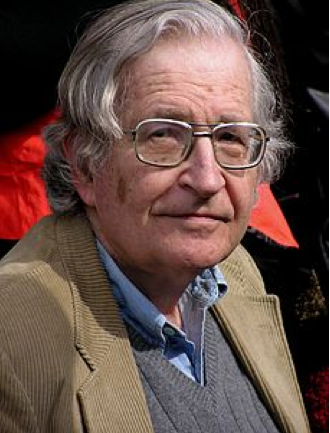Cross-posted from Asia Times
There is a "received standard version," common to academic scholarship, government pronouncements, and public discourse. It holds that the prime commitment of governments is to ensure security, and that the primary concern of the US and its allies since 1945 was the Russian threat.
There are a number of ways to evaluate the doctrine. One obvious question to ask is: What happened when the Russian threat disappeared in 1989? Answer: everything continued much as before.
The US immediately invaded Panama, killing probably thousands of people and installing a client regime. This was routine practice in US-dominated domains -- but in this case not quite as routine. For the first time, a major foreign policy act was not justified by an alleged Russian threat.
Instead, a series of fraudulent pretexts for the invasion were concocted that collapse instantly on examination. The media chimed in enthusiastically, lauding the magnificent achievement of defeating Panama, unconcerned that the pretexts were ludicrous, that the act itself was a radical violation of international law, and that it was bitterly condemned elsewhere, most harshly in Latin America. Also ignored was the US veto of a unanimous Security Council resolution condemning crimes by US troops during the invasion, with Britain alone abstaining.
All routine. And all forgotten (which is also routine).
From El Salvador to the Russian border
The administration of George H W Bush issued a new national security policy and defense budget in reaction to the collapse of the global enemy. It was pretty much the same as before, although with new pretexts. It was, it turned out, necessary to maintain a military establishment almost as great as the rest of the world combined and far more advanced in technological sophistication -- but not for defense against the now-nonexistent Soviet Union. Rather, the excuse now was the growing "technological sophistication" of Third World powers. Disciplined intellectuals understood that it would have been improper to collapse in ridicule, so they maintained a proper silence.
The US, the new programs insisted, must maintain its "defense industrial base." The phrase is a euphemism, referring to high-tech industry generally, which relies heavily on extensive state intervention for research and development, often under Pentagon cover, in what economists continue to call the US "free-market economy."
One of the most interesting provisions of the new plans had to do with the Middle East. There, it was declared, Washington must maintain intervention forces targeting a crucial region where the major problems "could not have been laid at the Kremlin's door." Contrary to 50 years of deceit, it was quietly conceded that the main concern was not the Russians, but rather what is called "radical nationalism," meaning independent nationalism not under US control.
All of this has evident bearing on the standard version, but it passed unnoticed -- or perhaps, therefore it passed unnoticed.
Other important events took place immediately after the fall of the Berlin Wall, ending the Cold War. One was in El Salvador, the leading recipient of US military aid -- apart from Israel-Egypt, a separate category -- and with one of the worst human rights records anywhere. That is a familiar and very close correlation.
The Salvadoran high command ordered the Atlacatl Brigade to invade the Jesuit University and murder six leading Latin American intellectuals, all Jesuit priests, including the rector, Fr. Ignacio Ellacuria, and any witnesses, meaning their housekeeper and her daughter. The Brigade had just returned from advanced counter-insurgency training at the US Army John F Kennedy Special Warfare Center and School in Fort Bragg, North Carolina, and had already left a bloody trail of thousands of the usual victims in the course of the US-run state terror campaign in El Salvador, one part of a broader terror and torture campaign throughout the region. All routine. Ignored and virtually forgotten in the United States and by its allies, again routine. But it tells us a lot about the factors that drive policy, if we care to look at the real world.
Another important event took place in Europe. Soviet president Mikhail Gorbachev agreed to allow the unification of Germany and its membership in NATO, a hostile military alliance. In the light of recent history, this was a most astonishing concession. There was a quid pro quo. President Bush and Secretary of State James Baker agreed that NATO would not expand "one inch to the East," meaning into East Germany. Instantly, they expanded NATO to East Germany.
Gorbachev was naturally outraged, but when he complained, he was instructed by Washington that this had only been a verbal promise, a gentleman's agreement, hence without force. If he was naive enough to accept the word of American leaders, it was his problem.
All of this, too, was routine, as was the silent acceptance and approval of the expansion of NATO in the US and the West generally. President Bill Clinton then expanded NATO further, right up to Russia's borders. Today, the world faces a serious crisis that is in no small measure a result of these policies.
The appeal of plundering the poor
Another source of evidence is the declassified historical record. It contains revealing accounts of the actual motives of state policy. The story is rich and complex, but a few persistent themes play a dominant role. One was articulated clearly at a western hemispheric conference called by the US in Mexico in February 1945 where Washington imposed "An Economic Charter of the Americas" designed to eliminate economic nationalism "in all its forms." There was one unspoken condition. Economic nationalism would be fine for the US whose economy relies heavily on massive state intervention.
(Note: You can view every article as one long page if you sign up as an Advocate Member, or higher).






